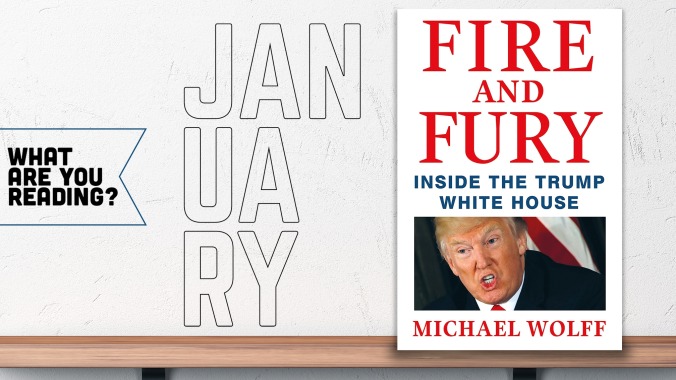What are you reading in January?


In our monthly book club, we discuss whatever we happen to be reading and ask everyone in the comments to do the same. What Are You Reading This Month?
Sean O’Neal
I’m reading Fire And Fury. Isn’t everyone reading Fire And Fury? Isn’t everyone, like me, asking themselves why they felt so impelled to read Fire And Fury—a book whose most salacious passages had already been pull-quoted and denounced by every major news site and blue check mark on Twitter mere hours after its release and, what’s more, are already wholly redundant to anyone who’s been semi-conscious over the past year? I, for one, am completely sick of talking about, writing about, reading about, and thinking about Donald Trump, whose latest shitty real estate venture is a gaudy, horizon-blocking high-rise plopped squarely in the midtown of the American mind. And yet, I also couldn’t help myself from tearing into Michael Wolff’s book the second it was available to me. Even worse, I largely read it on my phone, in blocks of idle moments on the train and in bed, just like I consumed all the events it recounts in real time.
I suppose there’s something symbolic about the fever for Fire And Fury in general: Filtering them through Wolff’s colorfully rendered, factually dubious, often slipshod retelling allows us to regard this unthinkable chain of events as just a crazy story, a blackly comic novel of bungling corruption and crisis that we can read with detached amusement. (And I’m not going to lie; it’s a good story, if a little implausible.) And for all of Wolff’s shaky journalistic ethics, or what was clearly an editor’s rush job, the book does a fairly good job of pulling all these blackout hallucination moments out of the jumbled haze and stringing them together, as comprehensively as can be expected for a tale that, really, a thousand monkeys at a thousand typewriters could keep banging away at for the next three to seven years, or until they kill themselves. I haven’t enjoyed it, exactly, and I could never fully recommend it. But of course, that’s what makes it the perfect historical record of our time.
Katie Rife
I was a bit hesitant to ask for a copy of celebrity mortician Caitlin Doughty’s new book, From Here To Eternity: Traveling The World To Find The Good Death, for Christmas. It’s not like my parents don’t know that their eldest daughter is a morbid sort—my middle school fascination with the Salem Witch Trials cemented that—but still, unwrapping a book about funerary practices around the world on Christmas morning still seemed to be pushing it. I needn’t have worried, though, as not only did I get the book, but my mom also told me she had paged through it and wanted to read it when I was done. Like Doughty’s first book, Smoke Gets In Your Eyes, From Here To Eternity combines wry, sharply observed biographical details from Doughty’s life—here, a travelogue of her visits to Mexico, Indonesia, Japan, Spain, Bolivia, and around the U.S. to observe wildly different funerary practices, from community funeral pyres to mummified ancestors—with her musings on the American way of death and how it alienates us from our own mortality and our bodies in general. Along the way, she sprinkles in fascinating cultural tidbits: Did you know, for example, that neon purple is the Bolivian color of death? Or that a traditional Japanese cremation ends with family members using special chopsticks to put their loved ones’ bones into an urn, a ritual known as kotsuage? It’s a book that will get you thinking about what you want to do with your corporeal form after you die (I’m hoping that there’s a place like Tokyo’s Ruriden columbarium where I can go, as a Blade Runner afterlife sounds right up my alley), making it a potentially useful tool to ease adult children and their aging parents into one of the most serious and difficult conversations of their lifetimes. And not just the morbid ones.
Josh Modell
We get a ton of books mailed to the A.V. Club office every week, most of them to poor Caitlin PenzeyMoog, who must pull the rare gem from the stacks of bad fantasy and self-help books. (Idea: fantasy self-help book! Eh, it’s probably been done.) It’s actually sort of easy for a handsome book like Doctorow: Collected Stories to stand out from the pack, with its classy deckle edge, embossed cover, and solid collection of jacket blurbs, from the likes of George Saunders and Ta-Nehisi Coates. I hadn’t read much by E.L. Doctorow—who died in 2015—maybe just Billy Bathgate in high school, and this one seemed like a welcome respite from the rut of music biographies I’d been in. These 15 short stories—assembled by the author before his death and released in this form early last year—are uniformly excellent, which should come as no surprise considering Doctorow is one of the most respected fiction writers of the 20th century. There’s no real common thread beyond their richness of detail and an incredible ability to illustrate characters’ inner turmoil. “Jolene: A Life” is a gorgeous, gutting tale of a woman done wrong time and again; “A House On The Plains” is about a pioneering woman who’s also a predator; “Wakefield” inhabits a man who walks away from his successful-ish life, but not too far away. (It was made into an apparently mediocre movie starring Bryan Cranston last year.) It was a fine introduction (re-introduction?) to Doctorow’s work, and I’ll be diving into his novels at some point.
Maybe after a few more rock books. I also recently plowed through Lizzy Goodman’s Meet Me In The Bathroom, the massive New York alt-rock oral history, and enjoyed it quite a bit. There’s some interesting history on the infighting between James Murphy and Tim Goldsworthy of DFA, and plenty of salacious details about the sex-and-drug-fueled fun (and not-so-fun) had by The Strokes and Interpol. Goodman got pretty much everybody to talk at length, and it’s fun (and breezy as hell) to find out what happened behind the scenes. I was particularly surprised and delighted to learn that all of the aughts indie-rock heroes—from The Strokes to Yeah Yeah Yeahs—considered Jonathan Fire*Eater to be an early influence. That band is due for a serious renaissance, and hopefully this will be the start of it. C’mon, Jack White, this seems like a prime candidate for a Third Man box set of some sort!